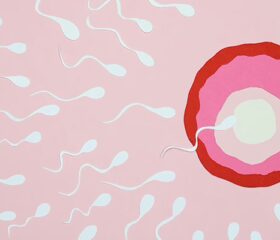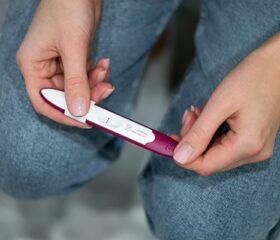Pregnancy After Tubal Ligation: What Are the Signs, and How Likely Is It?
Tubal ligation—or "getting your tubes tied"—is a surgical procedure that’s intended to be a permanent form of birth control. However, there’s a small chance you could still get pregnant afterward.

- How tubal ligation works
- Is pregnancy possible after tubal ligation?
- Are there any risks to getting pregnant after tubal ligation?
- What to do if you suspect you’re pregnant after a tubal ligation
- What to consider before getting tubal ligation
- True stories of pregnancy after tubal ligation
- Final thoughts
Tubal ligation involves blocking, cutting, tying, or sealing your fallopian tubes, preventing eggs from traveling to your uterus. This, in turn, prevents fertilization and pregnancy.
This contraceptive method is highly effective, failing less than 1% of the time, but it isn’t foolproof. 1 2
Read on for a look at how tubal ligation works and what the chances are of getting pregnant after having your tubes tied.
How tubal ligation works
During a tubal ligation, the fallopian tubes are cut, tied, clamped, banded, or sealed using heat or clips. 3
This blockage stops your eggs from traveling from the ovaries to the uterus (where they would typically meet sperm). It doesn’t destroy the eggs, which means you’ll still ovulate and menstruate (have periods), but as long as your tubes don’t grow back together, you can’t get pregnant.
Tubal ligation is different from a salpingectomy
Instead of a tubal ligation, some women opt for another procedure called a salpingectomy, which involves removing the fallopian tubes entirely, further reducing the risk of pregnancy and lowering the risk of ovarian cancer. 4 If you’re interested in a permanent contraceptive option, talk to your doctor about which is right for you.
Is pregnancy possible after tubal ligation?
The short answer is yes, you can get pregnant after undergoing tubal ligation, but it’s rare.
While the procedure is meant to be a permanent form of contraception, it’s possible for your fallopian tubes to reconnect or develop a small passageway, allowing sperm to reach an egg. 5
This process is known as “recanalization,” where the tubes essentially regenerate and grow back together.
Again, the likelihood of pregnancy after tubal ligation is low (under 1%, with many sources claiming it occurs in around 1 in 200 cases). However, that varies depending on factors such as your age and how your surgeon performed your tubal ligation. 2
What are the signs of pregnancy after tubal ligation?
If you’ve had a tubal ligation but conceive anyway, your early pregnancy symptoms will be “normal” (i.e., the same as most pregnant women have). They won’t be any different just because you had your tubes tied.
That means you may experience: 6
- A missed period (because tubal ligation doesn’t stop menstruation)
- Breast pain and tenderness
- Morning sickness (nausea and vomiting)
- Fatigue
- Frequent urination
- Food cravings or aversions
How likely is it that you’re actually pregnant if you have these signs?
If you had your tubes tied and are experiencing any of these signs, it’s possible you’ve experienced recanalization, but given how reliable tubal ligation is, it’s more likely there’s another explanation.
There are a surprising number of reasons you can miss your period, for instance, including stress, not eating enough, or simply developing an irregular menstrual cycle. Similarly, if you’re fatigued or nauseous, it’s possible you’re mistaking PMS symptoms for pregnancy.
Regardless, if you experience any of these symptoms, you should do the same thing you would if you’d never had your tubes tied: take an at-home pregnancy test when your period would have normally been due.
If you’re very concerned and want to find out earlier, you can also request a blood test from your doctor, which may be able to return accurate results before you miss your period (between 6 to 8 days after conception). 7
Are there clear signs of your tubes growing back together (recanalization)?
Unfortunately, it isn’t possible to tell if your tubes have grown back together before becoming pregnant. Recanalization is a slow and gradual process, and it isn’t painful.
Again, this very rarely happens, but the hard truth is that if it does, you might not know until you have a surprise conception.
Which factors influence your pregnancy risk after tubal ligation?
Several factors may influence the chances of getting pregnant after tubal ligation. The first is your age. Younger women have a higher chance of becoming pregnant after this procedure. 8
This doesn’t necessarily mean they’re more likely to experience recanalization; it could simply be due to being more fertile in general and experiencing higher pregnancy rates across the board.
Similarly, the longer it’s been since you had the procedure, the lower your risk of recanalization is. However, pregnancies have been reported as much as 20 years afterward, so there’s really no way to be certain it won’t happen. 9
Other reasons pregnancy can occur after tubal ligation
Recanalization isn’t the only way you can get pregnant after having your tubes tied. It can also happen due to:
- Surgical error: While this is also uncommon, improper sealing or incomplete blockage of the tubes can leave an opening for fertilization. 5 Some methods, like clips and bands, have a slightly higher failure rate than cutting and sealing. 9
- Pre-existing pregnancy: If you were already pregnant at the time of the procedure, getting your tubes tied won’t induce an abortion or otherwise terminate the pregnancy. If you’re carrying an already-fertilized egg, implantation can still occur after tubal ligation. 2
Are there any risks to getting pregnant after tubal ligation?
Unfortunately, if your tubes grow back together, any ensuing pregnancy will be riskier than if you’d never had the procedure.
Specifically, you’ll be at higher risk of an ectopic pregnancy, where a fertilized egg implants outside your uterus, usually in a fallopian tube. Ectopic pregnancies are not viable and can be dangerous (even life-threatening). 10
Signs of an ectopic pregnancy after tubal ligation
The signs you may have an ectopic pregnancy include:
- Sharp or dull pain on one side of the lower abdomen
- Pelvic pressure or discomfort
- Light spotting or unusual vaginal bleeding
- Shoulder pain, which could be a sign of internal bleeding (a medical emergency)
- Low back pain
- Dizziness or fainting
Note that these symptoms aren’t specific to having had your tubes tied—they may accompany an ectopic pregnancy even if you never had the procedure.
Call your doctor immediately if you suspect you have an ectopic pregnancy. Again, if a fertilized egg in your fallopian tube grows to the point where the tube ruptures, it can cause internal bleeding and shock. 10
What to do if you suspect you’re pregnant after a tubal ligation
As mentioned, if you think you might be pregnant after undergoing tubal ligation, take a pregnancy test to confirm it. If you test positive—or if you’re convinced you may have gotten a false negative on your test—call your doctor immediately. The risk of an ectopic pregnancy makes early detection very important.
Your doctor can confirm whether or not you’re pregnant, as well as whether your pregnancy is developing normally in the uterus.
What if you want to get pregnant after tubal ligation?
If you change your mind about having children after having a tubal ligation, talk to your doctor. There are two primary options to consider:
- Tubal ligation reversal: Depending on the method originally used, a surgical procedure may be able to reconnect your fallopian tubes. Success rates vary, and pregnancy rates range from 50%–80% after reversal. 3
- In vitro fertilization (IVF): This assisted reproductive technology bypasses the fallopian tubes entirely. 11 Your eggs will be retrieved, fertilized outside the body, and implanted directly into the uterus. IVF has a success rate of 30%–50% per cycle, depending on age and other factors like sperm vitality. 12
You’re best off speaking with your doctor if you’re unsure whether to opt for tubal reversal or IVF.
What to consider before getting tubal ligation
Because tubal ligation is intended to be permanent, you should only opt for it if you’re sure it’s the right move. Some women regret getting their tubes tied, and, although it’s possible to reverse it (by artificially inducing recanalization), that isn’t easy and doesn’t always work.
Before you decide, consider:
- Your age and life status
- Your current relationship with your partner (if you have one)
- The alternative birth control methods available to you
- How certain you are that you’ll never want to conceive in the future
Before making a final decision, discuss the procedure with your doctor to ensure that tubal ligation is the right choice for you and your long-term reproductive goals.
True stories of pregnancy after tubal ligation
Although getting pregnant after undergoing tubal ligation is rare, it happens often enough that moms in Glow’s community have shared stories about it happening. Check out just a few below:
- “My sister’s friend had twins after the first time that her tubes were tied and a single after the second time. She had her husband get a vasectomy”
- “With second morning urine today I took a test and it came back positive. I have been feeling pregnant for the last 4 days. I had my tubal done right after I gave birth to my last child almost 10 months ago.”
- “My sister in law had her tubes tied after her 4th child. Also had a c-section for that baby. 14/15 years later had a reversal and conceived within a year. Also had her 5th child vaginally! Our body’s are amazing! Best of luck!!”
- “Happened to me. I had filshie clips put on my tubes after my last daughter was born. 7 years later I found myself pregnant! Turns out one of the clips came off and my tube regenerated itself!! Go figure! I had a beautiful little girl 8 months later”
Stories taken from these threads on Glow’s message boards:
- “Anyone get pregnant after getting tubes cut and burned?”
- “TTC after Tubal Reversal”
- “Pregnant after tubal ligation.”
- “pregnant after tubes tied”
Note that accounts from Glow’s forums are anecdotal, and we haven’t confirmed their veracity.
Final thoughts
Although tubal ligation is highly effective, it’s not 100% guaranteed to work. Contraception failure is rare but possible, and if you do get pregnant, you’ll face a higher risk of an ectopic pregnancy.
If you think your tubal ligation has reversed itself and you may be pregnant, call your doctor immediately. You may need prompt medical attention, but as long as you get it, you’ll be fine.
Article Sources
- University of Rochester Medical Center. "Tubal Ligation" Retrieved April 15, 2025.
- U.S. Food & Drug Administration. "Birth Control" Retrieved April 15, 2025.
- Johns Hopkins Medicine. "Tubal Ligation" Retrieved April 15, 2025.
- Johns Hopkins Medicine. "Salpingectomy" Retrieved April 15, 2025.
- MedlinePlus. "Tubal Ligation" Retrieved April 15, 2025.
- Eunice Kennedy Shriver National Institute of Child Health and Human Development. "What are some common signs of pregnancy?" Retrieved April 15, 2025.
- U.S. Food & Drug Administration. "Pregnancy" Retrieved April 15, 2025.
- StatPearls. "Tubal Sterilization" Retrieved April 15, 2025.
- International Journal of Applied and Basic Medical Research. "Female sterilization failure: Review over a decade and its clinicopathological correlation" Retrieved April 15, 2025.
- Johns Hopkins Medicine. "Ectopic Pregnancy" Retrieved April 15, 2025.
- MedlinePlus. "In vitro fertilization (IVF)" Retrieved April 15, 2025.
- Society for Assisted Reproductive Technology. "Third Party Reproduction" Retrieved April 15, 2025.







